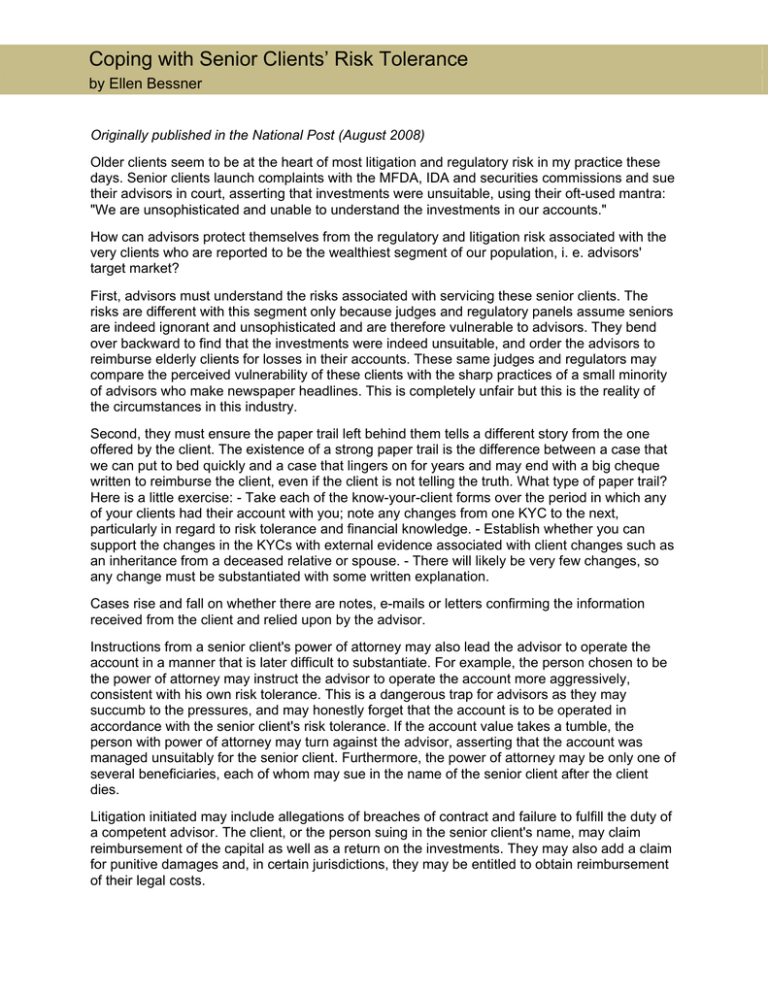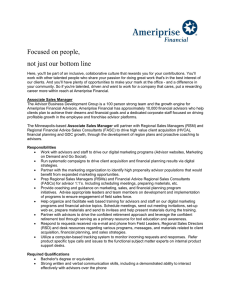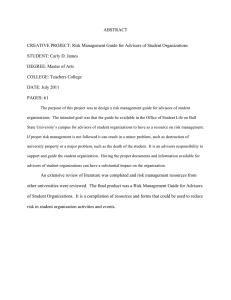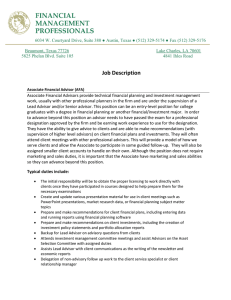Coping with Senior Clients’ Risk Tolerance by Ellen Bessner
advertisement

Coping with Senior Clients’ Risk Tolerance by Ellen Bessner Originally published in the National Post (August 2008) Older clients seem to be at the heart of most litigation and regulatory risk in my practice these days. Senior clients launch complaints with the MFDA, IDA and securities commissions and sue their advisors in court, asserting that investments were unsuitable, using their oft-used mantra: "We are unsophisticated and unable to understand the investments in our accounts." How can advisors protect themselves from the regulatory and litigation risk associated with the very clients who are reported to be the wealthiest segment of our population, i. e. advisors' target market? First, advisors must understand the risks associated with servicing these senior clients. The risks are different with this segment only because judges and regulatory panels assume seniors are indeed ignorant and unsophisticated and are therefore vulnerable to advisors. They bend over backward to find that the investments were indeed unsuitable, and order the advisors to reimburse elderly clients for losses in their accounts. These same judges and regulators may compare the perceived vulnerability of these clients with the sharp practices of a small minority of advisors who make newspaper headlines. This is completely unfair but this is the reality of the circumstances in this industry. Second, they must ensure the paper trail left behind them tells a different story from the one offered by the client. The existence of a strong paper trail is the difference between a case that we can put to bed quickly and a case that lingers on for years and may end with a big cheque written to reimburse the client, even if the client is not telling the truth. What type of paper trail? Here is a little exercise: - Take each of the know-your-client forms over the period in which any of your clients had their account with you; note any changes from one KYC to the next, particularly in regard to risk tolerance and financial knowledge. - Establish whether you can support the changes in the KYCs with external evidence associated with client changes such as an inheritance from a deceased relative or spouse. - There will likely be very few changes, so any change must be substantiated with some written explanation. Cases rise and fall on whether there are notes, e-mails or letters confirming the information received from the client and relied upon by the advisor. Instructions from a senior client's power of attorney may also lead the advisor to operate the account in a manner that is later difficult to substantiate. For example, the person chosen to be the power of attorney may instruct the advisor to operate the account more aggressively, consistent with his own risk tolerance. This is a dangerous trap for advisors as they may succumb to the pressures, and may honestly forget that the account is to be operated in accordance with the senior client's risk tolerance. If the account value takes a tumble, the person with power of attorney may turn against the advisor, asserting that the account was managed unsuitably for the senior client. Furthermore, the power of attorney may be only one of several beneficiaries, each of whom may sue in the name of the senior client after the client dies. Litigation initiated may include allegations of breaches of contract and failure to fulfill the duty of a competent advisor. The client, or the person suing in the senior client's name, may claim reimbursement of the capital as well as a return on the investments. They may also add a claim for punitive damages and, in certain jurisdictions, they may be entitled to obtain reimbursement of their legal costs. -2When faced with a situation in which an elderly client, or the person with power of attorney, wants to change the risk rating on the account, ask yourself whether you have the necessary evidence to satisfy a judge or regulatory panel that the change was in conformity with the true risk tolerance of the client. If not, speak to your branch manager or compliance officer to determine how you should handle the situation. Litigation and regulatory complaints are costly, reputationally as well as financially, so guard yourself against the common pitfalls associated with servicing seniors.



